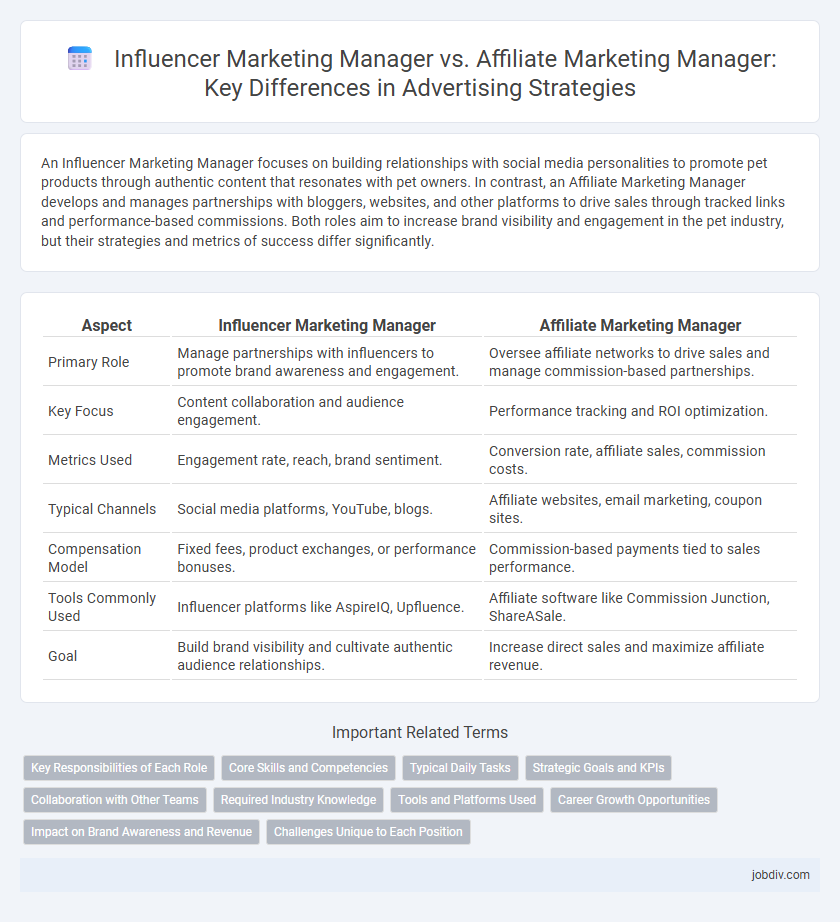An Influencer Marketing Manager focuses on building relationships with social media personalities to promote pet products through authentic content that resonates with pet owners. In contrast, an Affiliate Marketing Manager develops and manages partnerships with bloggers, websites, and other platforms to drive sales through tracked links and performance-based commissions. Both roles aim to increase brand visibility and engagement in the pet industry, but their strategies and metrics of success differ significantly.
Table of Comparison
| Aspect | Influencer Marketing Manager | Affiliate Marketing Manager |
|---|---|---|
| Primary Role | Manage partnerships with influencers to promote brand awareness and engagement. | Oversee affiliate networks to drive sales and manage commission-based partnerships. |
| Key Focus | Content collaboration and audience engagement. | Performance tracking and ROI optimization. |
| Metrics Used | Engagement rate, reach, brand sentiment. | Conversion rate, affiliate sales, commission costs. |
| Typical Channels | Social media platforms, YouTube, blogs. | Affiliate websites, email marketing, coupon sites. |
| Compensation Model | Fixed fees, product exchanges, or performance bonuses. | Commission-based payments tied to sales performance. |
| Tools Commonly Used | Influencer platforms like AspireIQ, Upfluence. | Affiliate software like Commission Junction, ShareASale. |
| Goal | Build brand visibility and cultivate authentic audience relationships. | Increase direct sales and maximize affiliate revenue. |
Key Responsibilities of Each Role
An Influencer Marketing Manager develops and manages collaborations with social media personalities to boost brand awareness through authentic content and engagement tracking. An Affiliate Marketing Manager oversees partner networks, optimizing affiliate campaigns, tracking conversions, and driving sales through commission-based marketing strategies. Both roles require analytics-driven performance assessment but differ in their focus on direct influencer relationships versus leveraging third-party promotional partnerships.
Core Skills and Competencies
Influencer Marketing Managers excel in relationship-building, content collaboration, and social media analytics, driving brand awareness through authentic influencer partnerships. Affiliate Marketing Managers specialize in performance tracking, commission structures, and strategic partner recruitment to optimize ROI and conversion rates. Both roles require strong communication and data analysis skills but differ in focus: influencer managers emphasize creative engagement, while affiliate managers prioritize measurable sales performance.
Typical Daily Tasks
Influencer Marketing Managers typically coordinate campaigns by identifying influencers, negotiating partnerships, and analyzing engagement metrics to optimize brand reach. Affiliate Marketing Managers focus on recruiting affiliates, tracking sales conversions, and managing commission structures to drive performance-based revenue growth. Both roles require data-driven decision-making and relationship management but emphasize different channels for customer acquisition.
Strategic Goals and KPIs
An Influencer Marketing Manager focuses on building authentic brand partnerships and increasing brand awareness through content engagement, with KPIs including follower growth, engagement rates, and influencer ROI. An Affiliate Marketing Manager targets performance-driven sales, optimizing partner networks to maximize conversion rates, average order value, and affiliate revenue. Both roles align strategically with driving brand growth, but differ in execution: influencer marketing emphasizes audience trust and content impact, while affiliate marketing prioritizes direct sales metrics and commission-based performance.
Collaboration with Other Teams
Influencer Marketing Managers excel at collaborating with creative and social media teams to craft authentic campaigns that resonate with target audiences, leveraging influencers' unique voices. Affiliate Marketing Managers partner closely with sales and analytics teams to optimize performance tracking and commission structures, ensuring measurable ROI through data-driven strategies. Both roles require seamless teamwork across departments but emphasize different collaboration styles aligned with their distinct marketing channels.
Required Industry Knowledge
An Influencer Marketing Manager must possess in-depth knowledge of social media platforms, content creation trends, and audience engagement strategies to effectively collaborate with influencers and optimize campaign reach. In contrast, an Affiliate Marketing Manager requires expertise in digital advertising metrics, affiliate networks, tracking technologies, and commission structures to drive measurable sales performance. Both roles demand strong analytical skills, but the influencer role emphasizes brand storytelling while the affiliate role prioritizes performance-based marketing tactics.
Tools and Platforms Used
Influencer Marketing Managers primarily leverage platforms like Instagram, YouTube, and TikTok, utilizing tools such as AspireIQ, Upfluence, and Traackr to identify, manage, and analyze influencer campaigns. Affiliate Marketing Managers focus on networks like CJ Affiliate, Rakuten, and ShareASale, employing tracking software like HasOffers and Impact to monitor affiliate performance and optimize commission structures. The distinct toolsets reflect the nuanced approaches each role takes to drive brand awareness and sales through different digital marketing channels.
Career Growth Opportunities
Influencer Marketing Managers typically experience rapid career growth due to the expanding demand for authentic brand storytelling and social media expertise, often advancing into strategic roles such as Brand Director or Marketing Consultant. Affiliate Marketing Managers benefit from data-driven skills and performance-based marketing knowledge, positioning them for growth in digital analytics, e-commerce strategy, or partnership management roles. Both career paths offer robust opportunities, but Influencer Marketing emphasizes creative brand engagement, while Affiliate Marketing focuses on measurable ROI and network optimization.
Impact on Brand Awareness and Revenue
Influencer Marketing Managers drive brand awareness by leveraging social media personalities with authentic, engaged followings, creating organic visibility and trust among target audiences. Affiliate Marketing Managers optimize revenue generation through performance-based partnerships, strategically aligning with affiliates who deliver measurable sales conversions and cost-effective customer acquisition. Both roles critically impact brand growth, with influencer strategies enhancing audience reach and affiliate programs directly boosting revenue streams.
Challenges Unique to Each Position
Influencer Marketing Managers face challenges such as managing authentic brand representation while coordinating multiple creators across diverse platforms, often requiring meticulous content approval and relationship-building strategies. Affiliate Marketing Managers encounter difficulties in optimizing performance tracking, managing commissions, and preventing fraudulent activities within a vast network of affiliates. Both roles demand specialized tools and analytics to measure ROI, but influencer managers prioritize creative engagement, whereas affiliate managers focus on conversion metrics and compliance.
Influencer Marketing Manager vs Affiliate Marketing Manager Infographic

 jobdiv.com
jobdiv.com